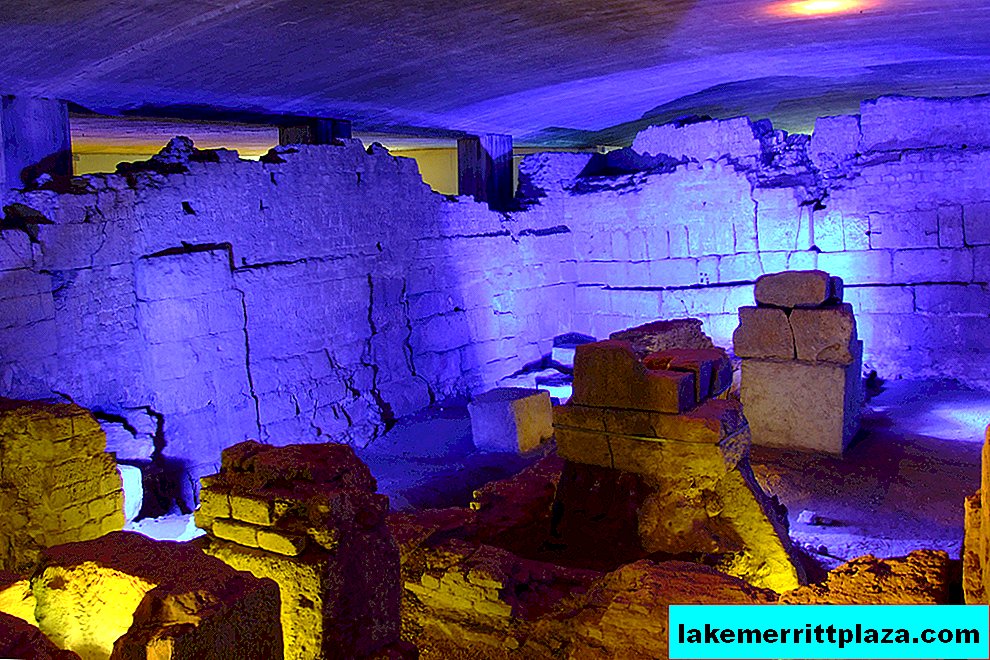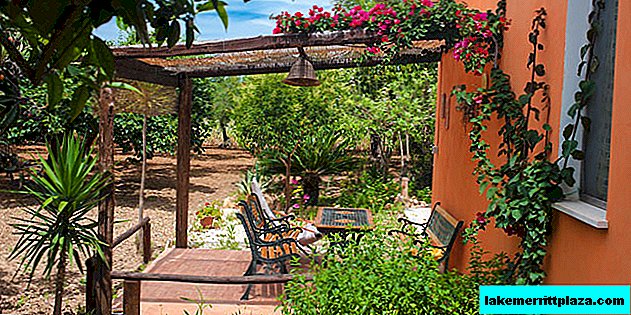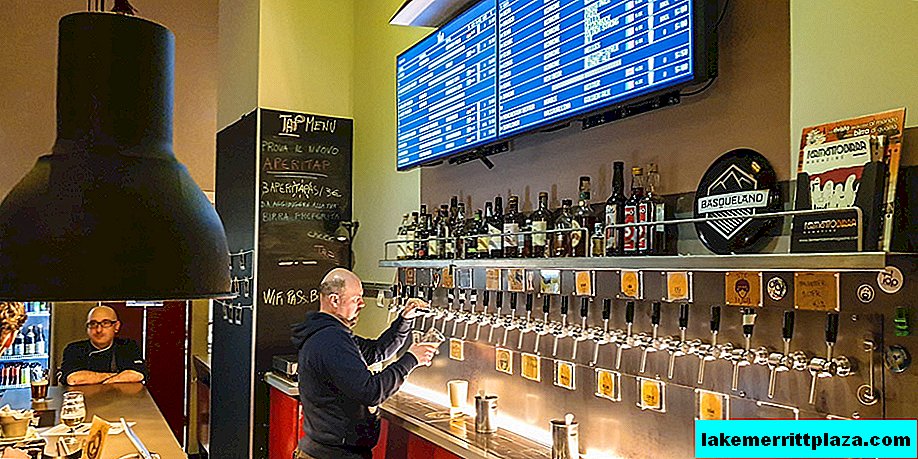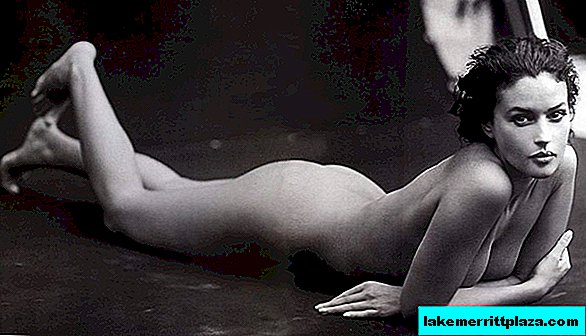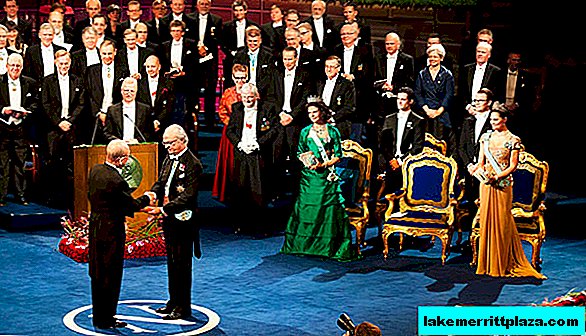The center of Rome is rich in attractions, like no other place in the world. From the abundance of remarkable places in the Eternal City, my eyes run wide. That is why BlogoItaliano has compiled a list of 12 of the most interesting places in the center of Rome so that you can easily get around the most important thing. And to make it easier for you to plan your trip, we marked all the most important places on the map, which you will also find in this article.
Helpful advice: Going to Rome, download a ready-made audio city center tour for iPhone. She will save you a ton of money in the Eternal City. The audio guide works even without the Internet, all points are plotted on a convenient map, and the built-in GPS makes it easy to find the way to route objects.
In the free version, 5 points are available, and the full version of the tour of 60 objects will cost you only a few euros - many times cheaper than even the most budget tours. You can download the audio guide to your iPhone on this page.
Santa Maria Maggiore
Most travelers begin their acquaintance with Rome from the forecourt: it is at Termini Station that the shuttles and electric trains arrive, connecting the city with Fiumicino Airport.
But few travelers notice that literally a few minutes walk from Termini, one of the main basilicas of the Eternal City - Santa Maria Maggiore.

The Basilica (4th century) is famous for the highest bell tower in the city.
Laid back in the 4th century, it is famous for the highest bell tower in the city: its height is 75 meters. And Santa Maria Maggiore is one of the 4 papal basilicas and one of the 7 pilgrimage churches of Rome officially approved by the Holy See.
- Opening hours: daily 7: 00-18: 30
- Free admission
Coliseum
The main amphitheater of all times and peoples has been decorating the center of Rome for almost 2 thousand years and is considered one of the main symbols of the Eternal City.
The gigantic structure began to be erected under the emperor Vespasian in 72 AD and finished unusually fast by ancient standards - already 8 years after the start of construction, the Colosseum accepted the first gladiator fights.
Visiting Rome and ignoring the Colosseum is unforgivable. It is noteworthy that at the beginning of the XXI century, when 7 new wonders of the World were determined by universal suffrage, the Colosseum became the only object from Europe that was included in the final list.
- Opening hours: daily from 08:30 to 16: 00-19: 00 (depending on the time of year)
- Tickets: 12 euros (also valid for visits to the Roman Forum and the Palatine)
Roman forum
The focus of ancient architectural monuments is striking in the abundance of columns, arches and dilapidated temples. Some remained only the foundation, others have survived to this day in almost pristine form.
Since ancient times, the Roman Forum has served as the heart of the city where the inhabitants of Rome gathered to discuss the most important issues or to celebrate the triumphal victories of the Roman army.

Since ancient times, the Roman Forum was considered the heart of the city
Among the buildings of the Forum that have survived to this day, it is especially worth highlighting the arches of Titus and Septimius Severus, the temple of Antoninus and Faustina, the Basilica of Maxentius and the colonnade of the temple of Saturn, which was considered one of the oldest in Rome.
- Opening hours: daily from 08:30 to 16: 00-19: 00 (depending on the time of year)
- Tickets: 12 euros (also valid for visits to the Coliseum and Palatine)
Capitol hill
Museums on Capitol Hill hold one of the main relics of Rome - a bronze sculpture of a she-wolf feeding Romulus and Remus.
But this is far from the only exhibit that deserves attention. Capitoline museums occupy three buildings, filled to capacity with antique artifacts. They are considered the oldest public museum in the world and trace their history back to the 15th century.
Museums are located along the perimeter of Capitol Square, the design of which is attributed to Michelangelo himself. A copy of the statue of Marcus Aurelius, the only equestrian statue preserved from antiquity to the present day, is decorated in the center of the square.
- Opening hours: daily 09: 30-19: 30
- Tickets: 15 Euro
Piazza Venezia and Vittoriano
What is located in the very center of Rome is Venice Square, where the main streets of the city and many of the sightseeing tours begin. It is here that the monument to the first king of united Italy, Victor Emmanuel II, is located.

Many sightseeing tours in Rome begin with Venice Square.
Many travelers mistakenly believe that the monument is an equestrian statue of the king, but in fact the monument is an entire huge snow-white building, and the sculpture of the monarch is only one of its elements.
Being on the square, be sure to climb to the observation deck at the top of the colossal complex. It is famous for one of the best views in Rome.
Trevi Fountain
Built into the facade of the Palazzo Poli, the Trevi Fountain is considered not only one of the main attractions of the center of Rome, but also one of the most famous fountains in the world.
Immortalized by Fellini in the movie Sweet Life, the Trevi Fountain gathers crowds of tourists around itself, regardless of the season.

The composition of the Trevi Fountain is harmoniously integrated into the facade of the Palazzo Poli
There is a tradition of throwing coins into the fountain in order to return to the Eternal City again. This custom is so popular that annually municipal authorities extract from the fountain up to 1.5 million euros.
Plaza de España and the Spanish Steps
Piazza di Spagna got its name from the Spanish Embassy located on it. It is here that the Spanish Steps of 138 steps, so often featured in cinema and literature, are located.

In the famous Spanish Steps 138 steps
Today, the staircase serves as a natural platform for numerous concerts and fashion shows, and on the square itself you can see one of Bernini's masterpieces - the Barkaccia fountain, which resembles a semi-sunken boat in shape.
Condotti Street, known as one of the main centers of Roman luxury shopping, originates from Plaza de España.
Pantheon
The Pantheon is one of the oldest buildings in Rome, perfectly preserved to this day. The modern building dates back to the 126th year of our era and was erected on the site of an older building, laid by Mark Vipsaniy Agrippa under the emperor Augustus.
The Temple of All Gods has no windows, and light enters through a single hole in the dome, considered a masterpiece of engineering. For over 1000 years, the Pantheon dome was the largest in the world and still amazes travelers.
In the Pantheon lies the ashes of kings Victor Emanuel II and Umberto I, the tomb of the great Raphael, as well as other prominent figures of Italy.
- Opening hours: Mon-Fri: 10: 00-18: 30, Sat: 10: 00-16: 00, Sun: 12: 00-17: 30
- Free admission
Navona Square and the Fountain of the Four Rivers
Piazza Navona is known for its unusual shape, inherited from the once ancient Domitian Stadium. There are numerous palazzos and one of the most famous Roman basilicas - St. Agnes.

Navona Square Moor Fountain (16th century)
The main decoration of the square is the fountain of the Four Rivers. Bernini's creation is a composition where the figures of river gods symbolize the Nile, Ganges, Danube and La Plata - the main rivers of 4 parts of the world. They surround the obelisk made in Egypt by order of the Roman emperor Domitian.
The other 2 fountains of the 16th century - Moor and Neptune - deserve attention on Piazza Navona.
Trastevere District
The Trastevere district is located near Piazza Navona on the opposite bank of Rome. Many interesting historical places have also been preserved here, but travelers are more attracted to the atmosphere of this place.
Trastevere retained the color of the small towns of Italy in the very center of the Eternal City. It is famous for a huge number of colorful establishments, pizzerias and cafes, where it is so nice to sit after an eventful day.
It is especially successful to come to Trastevere in the evening, when the aperitif hours begin in Rome, and the establishments offer free refreshments for ordered drinks.
Castle of the Holy Angel
If you cross the Tiber along the Elievy Bridge beyond Navona Square, you can get into a real castle. Today it is a military historical museum, but originally the Castle of the Holy Angel was intended for the burial of emperors.

View of the Castle of the Holy Angel from the other side of the Tiber
The castle was laid under the emperor Hadrian in 135 CE, but in the Middle Ages the solid walls of the building began to be used by the Roman popes to protect against barbaric raids and other conquerors.
Even if you are not at all interested in the battles of the past, you should definitely look at the fortress of the 2nd century - it is considered one of the main attractions in the historical center of Rome.
- Opening hours: daily 9: 00-19: 30
- Tickets: 14 Euro
Vatican and St. Peter's Basilica
The Vatican is located a little away from other most interesting places in the center of Rome, but it is simply impossible to ignore it.
In addition to the main center of Christianity, the Vatican is known for its luxurious museums, rightfully considered one of the richest collections of masterpieces in the world.
On the territory of the dwarf state, St. Peter's Cathedral, the largest Christian church in the world, and the Sistine Chapel, the former home church, where one of the most famous masterpieces in human history is located, the fresco The Last Judgment by Michelangelo, is also required to visit.
While in the Vatican, you should definitely go up to the observation deck on the Dome of the Cathedral, as well as send a postcard to your relatives through the mailbox on the roof of the temple.
Details on the opening hours of the main attractions of the dwarf state can be found in our articles on St. Peter's Basilica and the Vatican Museums.
Useful Tips
Of course, in Rome there are much more attractions than can be fit in the format of a short article and many of them are much better to visit as part of the tour than on their own.
For many years, BlogoItaliano has been friends in Rome with the organizer of the most interesting Russian-language excursions Lela. You can read about the 5 most interesting excursions organized by Lela in this article, or simply write her a request by e-mail email protected and ask to send a schedule and availability of space for city walks.
Another useful solution for travelers is our author's itinerary in Rome. This is a ready-made step-by-step plan for the whole day, which will help you easily plan your visit to the city and see the most important thing in it. A shortened version of the route can be found in our most useful article What to see in Rome on your own in 1 day.
If this article about the most interesting places in the center of Rome was useful to you, be sure to save it to your social networkto easily find in the future.
Photos by: blogoitaliano.com.


